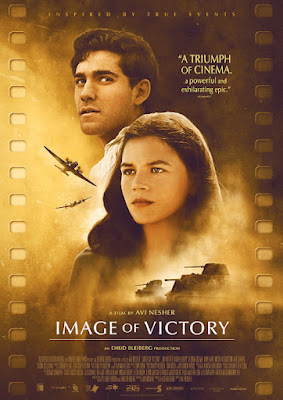For the Israelis, the Battle of Nitzanim was their greatest loss during their victorious War of Independence. For the Egyptians, it was a tactically meaningless victory, but it was carefully documented by a newsreel crew, to distract from the sting of losing the war. Despite their differences, both losses brought great national trauma. The battle and its surrounding circumstances are vividly brought to life in Avi Nesher’s Image of Victory, which starts streaming tomorrow on Netflix.
Residents of the Nitzanim kibbutz are keenly aware of its precarious location, so they constantly petition the military for greater defenses. Of course, such resources will be stretched thin after the Declaration of 1948. Both the residents and the garrisoned military personnel are about as rag-tag as it got in Israel’s early days. Many among the Defense Force had recently enlisted their way out of prison, joining several Holocaust survivors, both within their ranks and living at the kibbutz.
Mira Ben-Ari is the free-spirit of Nitzanim, but the European émigré is also a true believer in the kibbutz system. She has control of Nitzanim’s sole radio, so when Avraham Schwarzstein, the garrison commander, wants to run an operation, he has to take her with him. However, she can shoot.
Literally yards away, virulently anti-Semitic (CUNY calls it “anti-Zionism”) Egyptian journalist Mohamed Hassanein Heikal is embedded in a hostile Arab village, first with a squad of volunteer militia, and then with the official Egyptian army, once it declares war. The real army could take Nitzanim at any time, but such small potatoes are not worth their time and resources—until it becomes clear Egypt will lose this war—embarrassingly badly. King Farouk demands a “victory” Hassanein’s crew can package into face-saving propaganda for the Egyptian public. That was Nitzanim, but something about the way Ben-Ari conducted herself defending her home haunts Hassanein up until the in media res opening, set during the Camp David Accords.
Image is not unjustly described as an “anti-war” film, but it is somewhat unusual in that it critiques the war from both Israeli and Egyptian standpoints. Arab supremacists like Hassanein clearly wanted to pursue war to prosecute their prejudices, regardless of the human costs. Similarly, some of the Israeli hardliners (often “political officers” modeled on their Soviet counterparts) were too willing to sacrifice isolated settlers, like the Nitzanim kibbutzers, for “the greater good.”
It is also a rather daring strategy on Nesher’s part to make Hassanein the film’s narrative voice. Yet, Amir Khoury humanizes him to a remarkable extent, portraying him as equal parts journalist chafing under the Farouk’s censorship and kneejerk racial ideologue. It is actually quite an interesting performance. Joy Reigler also makes a charismatic war heroine as Ben-Ari, but the melodrama with her not ex-enough ex-lover gets a little tiresome.
There are some well-executed scenes of warfighting, but even though it holds the current record as Israel’s most expensive film production, Image did not intend to compete with the scope and immersive spectacle of films like 1917 and Dunkirk. What it really brings to the table is its ironic bite and big-picture historical perspective. Frankly, it is just as concerned with the insidiousness of propaganda as it is about the horrors of war, if not more so, which makes it considerably more interesting than typical anti-war statement-making. Clearly, it Nesher’s most ambitious film to date and his best since The Matchmaker. Highly recommended, Image of Victory starts streaming tomorrow (7/15) on Netflix.

